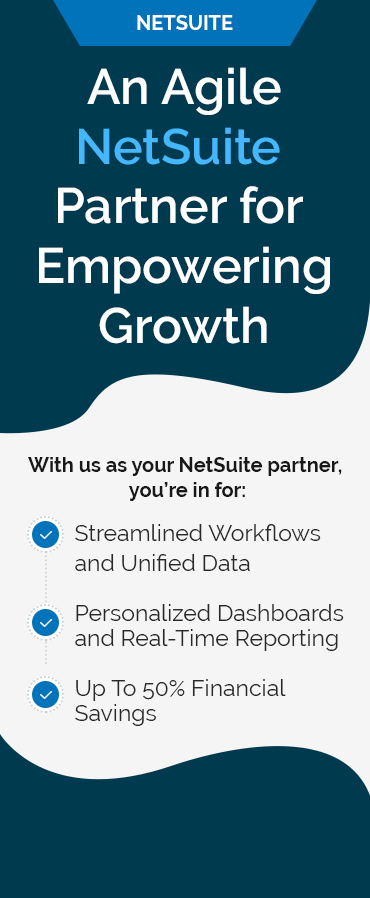The digital revolution is driving modern businesses forward.
A lot of advanced technologies are associated with digital transformation, including artificial intelligence (AI) and robotic process automation (RPA). However, the same thing can’t be said for general business applications like enterprise resource planning (ERP) systems.
While ERP is not new or disruptive, the technology is emerging from the back office into the front end of business transformation.
ERP has primarily focused on uniting traditional business management solutions and has transformed into a flexible foundation for integrating cutting-edge technology into organizations.
Essentially, an ERP solution that is well-configured can help organizations advance their digital maturity and drive transformations.
Talking of digital transformation, the introduction of cloud ERP provides an example of how ERP has evolved to help SMEs adopt and adapt to the new digital economy.
Before we dive into how cloud ERP empowers SMEs to become digitally driven, let’s see what makes it different from traditional ERP.
Cloud ERP vs Traditional ERP
In contrast to a cloud ERP, which is software that users access via the internet, a traditional ERP or on-premise ERP is software is installed on the company’s own hardware. On-premise or traditional ERP systems require specialized IT departments to maintain and upgrade database security. Whether it’s long-term maintenance or manpower costs, it’s a huge expense for any business.
A second significant difference between a cloud-based solution and an on-premise solution is the level of value. In general, a cloud-based system has a lower cost due to the fact that your contract is based on a monthly subscription where all the additional periodic expenses associated with support, training, upgrades, and infrastructure are already included in your monthly subscription.
In contrast, to fully implement on-premise ERP, a company may need to update its computer arsenal. Furthermore, they may need to invest in hardware maintenance, parts replacement, and software upgrades as time goes on.
All of these things are now history with cloud ERP!
The Role of Cloud ERP as a Transformative Force for SMEs
As per a report, around 35% of SMEs prefer to invest in digital technologies to support their business. Here are the top drivers to invest in digital technology.[I]

Based on the same survey results, 48% of SMEs plan to engage in activities that will enable them to adapt and transform their businesses.[I]
Thus, placing high bets on cloud ERP makes all the sense.
Some Notable Benefits That Make the Case for Cloud ERP

Lower Operating Costs
Manual upkeep and periodic hardware updates are part of traditional onsite ERP, which can impact a company’s budget. By contrast, cloud ERP has relatively low operating costs.
Security Enhancements
The superior security offered by cloud ERP is one of its greatest advantages. It is crucial that operations remain foolproof at all times when storing and retrieving classified company data. Since Cloud ERP tracks and encrypts all activity, it ensures that your data can’t be hacked by a third party.
Superior UAT and API Testing
A cloud platform makes it easier to beta-test application programming interfaces (APIs). Additionally, cloud ERP facilitates user acceptance testing (UAT). Companies can identify issues prone to arise with a product in a working environment when testing over the cloud. In contrast to traditional testing settings, cloud ERP delivers accurate results for user acceptance testing and API beta testing.
Scalability at All Stages of Growth
As a company grows, cloud ERP makes scaling a breeze, since you can adjust the infrastructure to suit your needs. With cloud ERP, new and small businesses can bypass the growing pains of scalability that many veteran businesses have faced in the past.
Less Technical Requirements
One of the main benefits of cloud ERP is that network hardware does not have to be purchased separately. The service itself is billed on a subscription basis. This means that your company will not have to invest in new hardware just to use the service’s features. By eliminating earmarks for hardware repairs and software upgrades, cloud ERP allows companies to manage operations more efficiently and affordably.
Automated, Paperless Accounting
Unless you have an enterprise resource planning system, accounting for an online retail store can be challenging. You can keep track of your accounts and update information on a daily basis with cloud-based ERP. Furthermore, cloud ERP makes it easier to generate invoices and process returns without having to sort files or manage paperwork.
In terms of the benefits Cloud ERP brings to the table, this is just the tip of the iceberg.
It’s easy to think choosing any cloud-based ERP vendor will kick-start your journey to digital transformation.
However, partnering with the right vendor, like NetSuite, can make all the difference.
NetSuite’s Role in Driving Digital Transformation
Cloud ERP is synonymous with NetSuite ERP, which introduced the cloud revolution to the ERP realm.
Currently, Oracle NetSuite is the world’s fastest-growing cloud-based ERP platform. It empowers businesses, startups, and organizations to unleash digital transformation and revolutionize their overall productivity.
The cloud-based platform manages every aspect of information management and seamlessly provides updates, optimizations, and control without spending a fortune on managing and optimizing data servers.
Know how NetSuite is reinventing the ERP space with the top three ERP trends. Get an in-depth insight with our exclusive eBook on ERP trends for 2023.
Want to Maximize the Efficiency of Netsuite Erp or Customize It per Your Business Needs? Talk to Us!
Drop us a line at [email protected] and our NetSuite experts will take it from there.
Statistical References:












